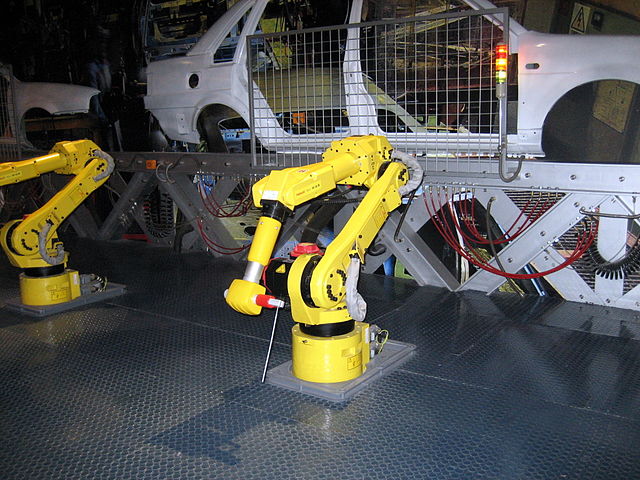
Robot worker
(Image by (Not Known) Wikipedia (commons.wikimedia.org), Author: Author Not Given) Details Source DMCA
Writing in Reason magazine, Ronald Bailey asks (and tries to answer) a question you've probably been hearing a lot lately and may have silently asked yourself: "Are Robots Going to Steal Our Jobs?" Bailey takes an optimistic view. "[A]s we look ahead now to the end of the 21st century, we can't predict what jobs workers will be doing, he writes. "But that's no reason to assume those jobs won't exist."
Bailey has history on his side. On the other hand, the question is certainly worth taking seriously.
Technological advances have historically ended up creating more jobs than they eliminate and increasing the aggregate wealth and power of the societies which adopt them. Oral Messengers and Backpack Wheat Carriers Union, Sumer Local #1, probably lobbied against the adoption of writing and the wheel, but it's hard to envision a path from Sumer to modern civilization that doesn't include them. And by comparison to the kings of Sumer, the lowest quintile of any developed society today live like, well, kings. Technological advancement makes more things available to more people more cheaply. Technological stagnation produces social stagnation a la the Dark Ages.
Will the current era of automation culminate in the opposite of historical results -- mass unemployment, a dramatic increase in the wealth and power gap separating rich and poor?
Or are we at the doorway to a "post-scarcity" era, a product of what Ray Kurzweil calls the Law of Accelerating Returns, in which work as we know it becomes highly optional because the necessities and minor luxuries of life get so cheap that we're free spend the bulk of our time doing whatever we please instead of scrabbling for food, shelter, clothing, and cable television?
The answer may not be quite so binary. Maybe things will just keep slowly getting better, or maybe they'll start slowly getting worse.
But my guess is that if we can successfully shed the burden of our most regressive and wealth-draining social institution -- political government, aka the state -- before it drags us down into global totalitarian slavery or nuclear suicide, the future will look a lot more like the latter than like the former.
In the US, government leeches more than third of GDP directly out of the productive sector and into its political schemes, and kills still more of the productive sector's potential with regulation.
The democratization of technology (these days you can make things in your garage or on your desktop that could only be made in a large factory 50 years ago) and the rise of economic networks that can at least potentially function beyond the reach of state taxation and regulation represent an opportunity to take back the future. Let's seize that opportunity.




